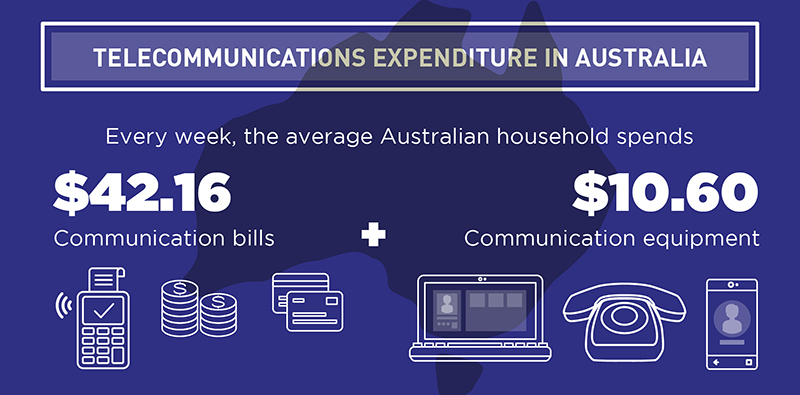 A new report released today by Australia’s peak communications consumer organisation, the Australian Communications Consumer Action Network (ACCAN), shows that telco customer service representatives are being encouraged to focus on selling over service, potentially exposing consumers to questionable selling practices.
A new report released today by Australia’s peak communications consumer organisation, the Australian Communications Consumer Action Network (ACCAN), shows that telco customer service representatives are being encouraged to focus on selling over service, potentially exposing consumers to questionable selling practices.
ACCAN has observed a lower proportion of fixed Internet service uptake in rented households, as well as reports relating to barriers about access to this type of service. These barriers are often due to the imbalance of power between renters and landlords.
This is a concern for ACCAN, who have raised questions around the proportion of rented households who have deliberately chosen mobile services for their home.
Read more: Issues faced by renters in Australia’s phone and internet market
 In 2017, Google and ACCAN once again partnered to offer a paid internship to a recent graduate who wished to explore an emerging communications consumer issue.
In 2017, Google and ACCAN once again partnered to offer a paid internship to a recent graduate who wished to explore an emerging communications consumer issue.
After submitting a brief proposal which outlined her desired research project, recent law and media graduate Jelena Ardalic was selected as the winner of the internship. Ardalic’s report, ‘Midas Touch: Consumer Implications of the Use of Smartphone Biometric Data’, discusses the impact that the use of biometrics (e.g. fingerprints, face recognition etc.) may have upon consumers’ privacy.
Read more: Midas Touch: Consumer Implications of the Use of Smartphone Biometric Data
Results from ACCAN’s Customer Service Survey
The survey was conducted with 1,347 telecommunications consumers who had contacted their provider about a question or problem in the previous 12 months. Respondents were customers of 10 different providers- eight are those with the biggest market share plus the two providers with the largest number of satellite customers (to ensure the survey was not solely urban focused). Respondent targets (see Figure 1 of the report) for each provider were set according to estimated market share, calculated using the most recent annual reports of the providers and cross checked against the Australian Communications and Media Authority Communications Report 2016. The following table shows sample sizes achieved and weightings attributed.
Read more: CAN YOU HEAR ME? Ranking the customer service of Australia’s phone and internet companies
 ACCAN worked with Dr Greg Ogle of the South Australian Council of Social Services to analyse the detailed telecommunications data from the Australian Bureau of Statistics’ 2015-16 Household Expenditure Survey. This analysis provides a more detailed view of the telecommunications expenditure of different groups in Australia.
ACCAN worked with Dr Greg Ogle of the South Australian Council of Social Services to analyse the detailed telecommunications data from the Australian Bureau of Statistics’ 2015-16 Household Expenditure Survey. This analysis provides a more detailed view of the telecommunications expenditure of different groups in Australia.
Some key findings are that:
 An interdisciplinary team of researchers at the University of Melbourne have updated their research on the fate of online accounts, financial assets and personal profiles when a user passes away. The team investigated licencing policies, terms of use agreements and copyright law, and interviewed a range of people, including funeral directors, religious workers, internet content and service providers, as well as estate planning lawyers.
An interdisciplinary team of researchers at the University of Melbourne have updated their research on the fate of online accounts, financial assets and personal profiles when a user passes away. The team investigated licencing policies, terms of use agreements and copyright law, and interviewed a range of people, including funeral directors, religious workers, internet content and service providers, as well as estate planning lawyers.
The updated version includes new features and services such as 'legacy contact' options, legislation changes and online bereavement practices.
Google and ACCAN partnered again in 2017 to offer a paid internship opportunity. Applicants were invited to submit a brief proposal outlining a research project on an emerging communications consumer issue.
The winner was law and communications student, Jesse Chen, who wrote an in-depth research report titled: 'Breaking Down Barriers to Digital Government: How can we enable vulnerable consumers to have equal participation in digital government?
In 2016 ACCAN commissioned a follow-up to our 2014 Disability Mystery Shopping survey. Disappointingly, the results indicate that little has changed for consumers with disability in the intervening years. Telco sales staff have very little knowledge of products or services suitable for consumers with disability.
Despite industry initiatives to improve the availability of appropriate information after the 2014 survey consumers with disability continue to struggle to find relevant and useful information about mainstream telecommunications products.
 Results from a survey commissioned by ACCAN show that 12 per cent of respondents had experienced unexpected third party charges on their mobile phone bills in the last six months. Consumers can opt out of these services by texting ‘STOP’ to SMS notifications they receive from third party providers. However, ACCAN’s survey found that over three quarters (77 per cent) of people who replied ‘STOP’ still had the charge added to their bill. Over a third (36 per cent) of unexpected charges were for $10 or more.
Results from a survey commissioned by ACCAN show that 12 per cent of respondents had experienced unexpected third party charges on their mobile phone bills in the last six months. Consumers can opt out of these services by texting ‘STOP’ to SMS notifications they receive from third party providers. However, ACCAN’s survey found that over three quarters (77 per cent) of people who replied ‘STOP’ still had the charge added to their bill. Over a third (36 per cent) of unexpected charges were for $10 or more.
Read more: Third Party Charges - consumer experiences and expectations
 ACCAN and Infoxchange have come together to produce a report focusing on the more than 427,000 dwellings (about 5 per cent of housing stock) in Australia which fall into the category of social housing – housing provided by the government and community sectors to accommodate people in the lowest income brackets. Residents of social housing are more likely to fall on the wrong side of the digital divide, and face a range of barriers in getting connected. These barriers can be practical, such as getting permissions to install connections in old apartment blocks, budgetary, where the cost to sign up may be prohibitive, or may be related to digital literacy.
ACCAN and Infoxchange have come together to produce a report focusing on the more than 427,000 dwellings (about 5 per cent of housing stock) in Australia which fall into the category of social housing – housing provided by the government and community sectors to accommodate people in the lowest income brackets. Residents of social housing are more likely to fall on the wrong side of the digital divide, and face a range of barriers in getting connected. These barriers can be practical, such as getting permissions to install connections in old apartment blocks, budgetary, where the cost to sign up may be prohibitive, or may be related to digital literacy.
In May 2015, ACCAN commissioned Galaxy Research to complete a survey of consumers regarding telco and ISP complaints. The survey found that 46 per cent of telco consumers reported having a problem with their phone or internet provider in the last year, representing more than 8.5 million Australians.
According to the survey, around one third of respondents (38 per cent) who had a problem with their phone or internet service, complained to their provider and were dissatisfied with the response from the telco. However, only nine per cent of these consumers escalated their complaint to the TIO suggesting that phone and internet providers have not improved the proportion of complaints that are resolved.

ACCAN has worked with Dr Paul Harrison (Deakin University) to examine the extent to which consumers understand the information provided to them by telecommunications providers. This research will guide ACCAN’s constructive contribution to future reviews of telecommunications industry customer information obligations, at a time when significant structural changes in the telecommunications market mean that consumers will be offered greater choice of retail providers and services.
Read more: Confident, but Confounded: Consumer Comprehension of Telecommunications Agreements
As our communications market continues to develop and the essential nature of network connectivity increases, issues of affordability for many Australians are creating barriers to our communications networks. Overcoming these barriers is increasingly important as government services and information become ‘digital by default’. Ensuring that all Australians are able to afford to connect to communications networks and services suitable to their specific needs will increase economic, social and community participation.
This research report examined the implications of digital technology, particularly mobile apps, for the management of cultural knowledge. A group of young Aboriginal Australians participated in this project which mapped how they used apps to explore cultural knowledge.
The report is available through the ACCAN Grants Scheme webpage.
An interdisciplinary team of researchers at the University of Melbourne investigated the fate of online accounts, financial assets and personal profiles when a user passes away. The team investigated licencing policies, terms of use agreements and copyright law, and interviewed a range of people, including funeral directors, religious workers, internet content and service providers, as well as estate planning lawyers. This work has been updated in 2017 and is now in a second edition.
The report, as well as further information, can be accessed via the ACCAN Grants Scheme webpage.
The Australian Seniors Computer Clubs Association (ASCCA) conducted research on the effectiveness of various digital literacy training methodologies that were being used by ASCCA's member clubs around Australia.
Further information on the project and the final report is available on the ACCAN Grants Scheme webpage.
In November 2012 the Telstra Telephone Exchange at Warrnambool, south west Victoria, caught on fire and disrupted the telecommunications services of an entire region. This research, conducted by RMIT University and funded under the ACCAN Grants Scheme, examined the social and financial impact of this outage on the residents and small businesses of the region.
The research report, as well as a series of 'survival plans' for businesses, government and individuals, can be found on the Grants Scheme webpage.
Earlier this year Google and ACCAN partnered to offer a paid internship opportunity with ACCAN. Applicants were invited to submit a brief proposal outlining a research project on an emerging communications consumer issue.
The winner was recent law graduate David Seidler, who tackled the hot topic of data retention. Seidler’s report Hacking the Grapevine: Data Retention and protecting Australian consumer privacy is a first-class piece of research by a talented up-and-coming lawyer.
ACCAN's fine print project into misleading or unfair terms in telco consumer contracts was undertaken by researcher Dr Jeannie Paterson, a consumer law expert from Melbourne Law School. Dr Paterson examined the contracts for 42 products across ten providers.
ACCAN commissioned ACA Research to analyse the global roaming charges of 12 popular providers across the top ten overseas destinations visited short-term by Australian residents. The research took place during July and August 2013 but was was updated with new pricing details in September and October 2013.
